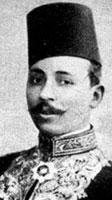Mustafa Kamil Pasha: Difference between revisions
m {{Egypt-writer-stub}} |
Shaolin128 (talk | contribs) +fr |
||
| Line 22: | Line 22: | ||
[[ar:مصطفى كامل]] |
[[ar:مصطفى كامل]] |
||
[[fr:Mustafa Kamil]] |
|||
{{Egypt-politician-stub}} |
{{Egypt-politician-stub}} |
||
Revision as of 16:28, 18 June 2007
- For the tutor to Prince Karim see Mustafa Kamil (academic).

Mustafā Kāmil Pasha (Arabic: مصطفى كامل) (August 14, 1874, Cairo, Egypt - February 10, 1908, Cairo) was an Egyptian journalist and political figure. The son of an Egyptian army officer, Mustafa Kamil was trained as a lawyer at the French law school in Cairo and the Law Faculty at the University of Toulouse in France. He began his career as an Egyptian nationalist by collaborating with the French, the Ottoman sultan, and Khedive Abbas Hilmi II. As he matured, however, he gradually grew more independent of outside backers and appealed mainly to the Egyptian people to demand the withdrawal of the British army of occupation from Egypt. He also called on Khedive Abbas to grant constitutional government to his subjects.
He was strongly backed by one of Egypt's nobles "Pasha" Mohammad Farid, who spent his last penny on the Egyptian independence case even after Mustafa's death - as he became the leader of the National Party - and he was the one who made it possible for Kamil to visit France and Britain.
In 1900, Kamil founded the newspaper Al-Liwa' ("The Standard") as a platform for his views and utilized his skill as both a journalist and lawyer. His cause was aided by an atrocity known as the Dinshaway Incident (June 1906), in which four peasants were hastily tried and hanged for having assaulted uniformed British officers who were shooting pigeons in their village. He founded the National Party in December 1907, two months before his death. His funeral was the occasion for a massive demonstration of popular grief. He is remembered as a fervent patriot and an articulate advocate of Egyptian independence.
References
- "Kamil, Mustafa." Encyclopædia Britannica. 2005. Encyclopædia Britannica Online. 5 Oct. 2005.
- Arthur Goldschmidt Jr. (2000). Biographical Dictionary of Modern Egypt. Boulder: Lynne Rienner. pp. 101-103.
- Fazlur Rahman (1984). Islam & Modernity. University Of Chicago Press. ISBN 0-226-70284-7.
